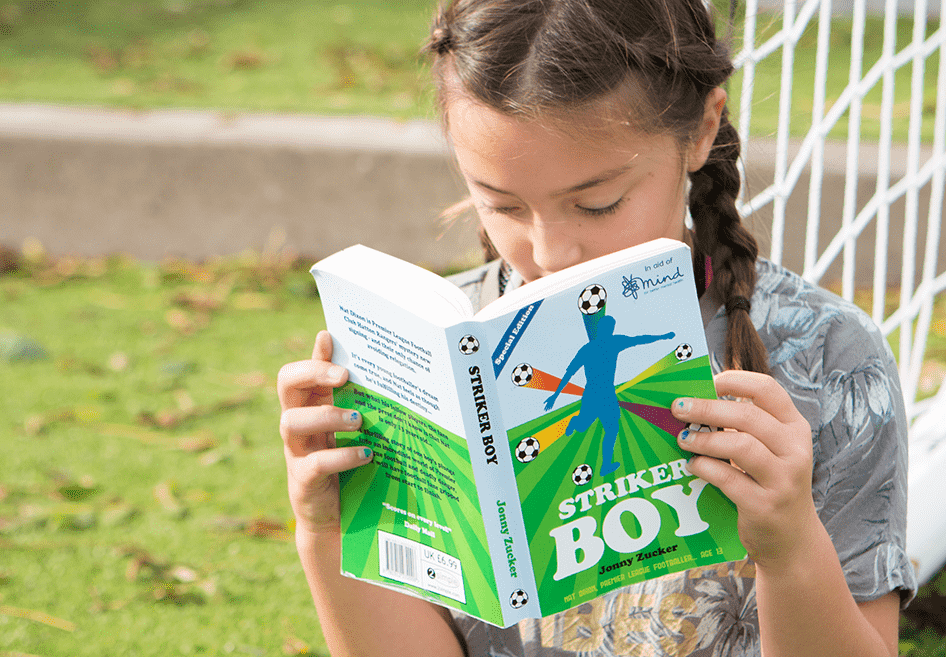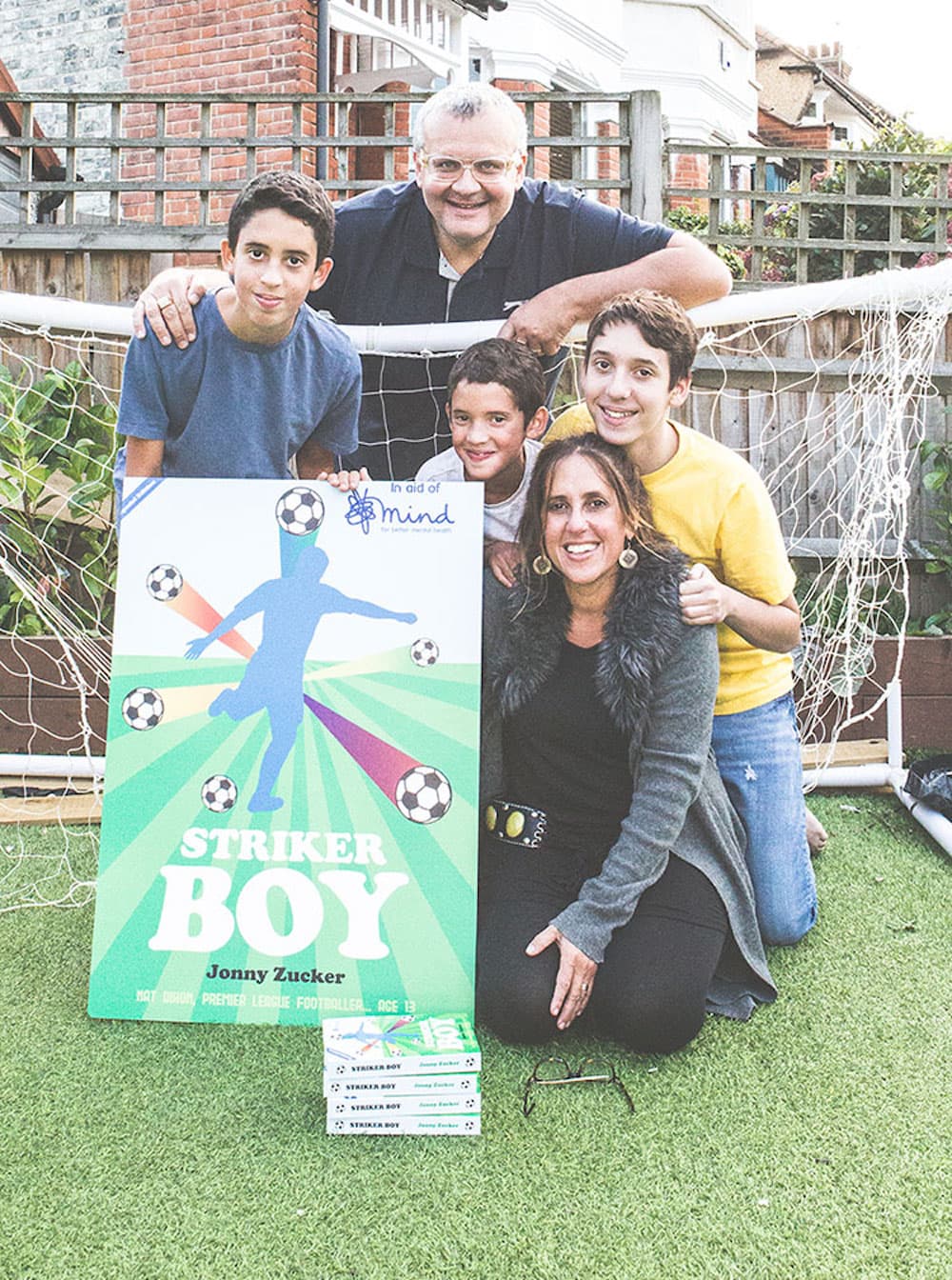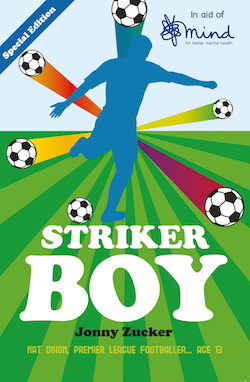Striker Boy: The campaign celebrating the life of its author in aid of Mind
updated on Feb 21, 2018

Of the more than 100 books that Jonny Zucker had written, Striker Boy was always his and his family's favourite. Now, Striker Boy has been republished in aid of the mental health charity, Mind. We spoke to the manager of the Striker Boy campaign, Sam de Lange, to find out more about Jonny, and his legacy
Like all of us, Jonny Zucker was lots of things. He was a loving husband and adoring father. For many years he was a primary school teacher, before focusing full-time on writing and becoming a successful children’s author. He was a comedian, musician and massive football fan. He was also a person who experienced severe bouts of mental illness throughout his adult life, and tragically took his own life aged 49, days before his 50th birthday.
For those who met Jonny, myself included, the thing that stood out most was his incredible ability to make people feel good about themselves.

Jonny Zucker and his family
I first met Jonny in his North London kitchen just over four years ago. He had been working with a software company to build an online library for kids, and I’d been brought on as a project manager. I arrived at his house clutching a four-page plan that I had put together in preparation. It wasn’t a bad plan, but it wasn’t going to win a Pulitzer.
Jonny read the plan in silence and then looked up, suddenly wide-eyed, threw his hands into the air and proclaimed loudly: “You’re a genius, what is this wizardry, how do you even know how to do this?!” You meet a lot of people who hyperbolise, but with Jonny it was always honest and sincere. I’ll never forget that meeting, and it was the start of a brilliant working relationship and friendship.
Jonny was an educator, but he was also a natural born entertainer. Anyone who ever saw Jonny teach will know that he blended the two skills seamlessly. He loved to inspire, excite and engage, and believed passionately that children learn best when they are having fun.
So, writing thrilling children’s fiction was an obvious choice! Jonny wanted children to experience the joy that comes from a great story, as well as the educational benefits that come with improved literacy. He always hoped that his books would be the gateway to a lifelong love of reading.
Yes. Outside of his family and writing, football was Jonny's great love. Being an Arsenal fan, it wasn’t always an easy relationship!
As a child, Jonny enjoyed playing and reading books about football. There’s no doubt that the plot of Striker Boy borrows from Jonny’s own boyhood daydreaming. As an adult, he qualified as an FA coach and loved nothing more than taking his three young sons to watch Arsenal. The club have been very supportive of the Striker Boy campaign; we were honoured that the head of Arsenal in the Community, Alan Sefton MBE, attended a memorial event for Jonny, where he met his three sons.

Jonny's family campaigning
With an estimated 3.5 billion fans, football is by far the world's most popular spectator sport. And whilst we welcome the changes that are attracting more women to the game, it is still a predominantly male audience.
Suicide is the number one killer of men under 50 and 75% of all suicides are male.
With such a large captive audience, football has, not just an opportunity, but an obligation to promote mental health awareness and stamp out discrimination.
Historically, the terraces have been a place where stigmas were reinforced not broken down. I remember going to games as a child and regularly hearing homophobic and sexist chants. However, things have come a long way and football, in the UK, is now a major platform for positive social change.
The stance that the footballing establishments take on mental health is incredibly important in changing the public's perceptions. This includes everyone from the board of the FA to the pundits on Match of the Day.
Through the Striker Boy campaign we have worked with dozens of football clubs including Arsenal, Manchester City, and Chelsea. Every club we have spoken to has told us that promoting mental health awareness is a huge priority for them.
We always had two clear aims. To honour Jonny’s memory by getting kids reading and to raise money for Mind, so that those people experiencing mental health problems could receive the support and respect they deserve. Jonny was a Mind service user, and sadly he experienced first-hand that demand for services is often outstretching supply.

Jonny was a much-loved figure in the community and his death had a profound impact on everyone who knew him. At his funeral, a seemingly endless line of mourners snaked through the cemetery. And within days of his death, we decided we wanted to do something to honour is memory.
That is why together with his family and the mental health charity Mind, we have re-published a special not-for-profit edition of his popular novel Striker Boy.
We chose Striker Boy for the simple reason that it was the best. It was the best because it has that cross-generational appeal that makes it genuinely enjoyable for children and adults alike. It was the best because it was long enough to give children a genuine sense of achievement when they get to the end, but it’s broken down into short snappy chapters that make it an easy read. It was the best because the plot is fast-paced and intense but also has sincere emotional depth. And because it’s the best it was always Jonny’s favourite and his children’s favourite too. So it was an easy choice really.
When we first started the the campaign our aims really were quite simple, and also separate. To honour Jonny’s memory by getting kids reading Striker Boy, and to raise money for Mind.
However, quite quickly the campaign became more than that. It started when we developed free emotional resilience resources to accompany the book, which then branched out into running emotional resilience sessions in schools and football clubs.

At a recent emotional resilience session we ran at Swansea football club, a 10-year-old boy came up to me at the end and said: "Thank you for that, it was exactly what I needed in my life right now".
So now as well as raising money for Mind we are actively involved in promoting mental health awareness and emotional resilience in children. But we honestly haven’t set any "targets" for the campaign. None of us expected to be here really, it isn’t something we planned for. Everyone working on the campaign knew Jonny. We're just doing what comes naturally to honour our friend.
If you would like to find out more about the campaign, or buy a copy of Striker Boy, go to www.strikerboy.com

